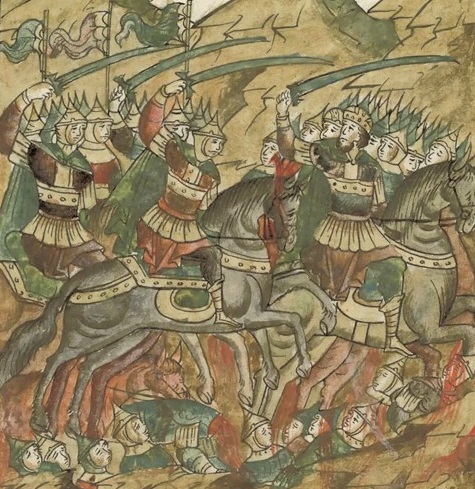The Russian memory of the ‘Tatar Yoke’
A painting of the Mongols' victory against the Russian army on the Kalka River on display in the office of the Spiritual Administration of Muslims is sparking heated discussions in Moscow. The image was removed with an apology, but Vice-President Mukhetdinov insists on emphasising the legacy of the Golden Horde in today's Russia.
Moscow (AsiaNews) - A ‘historical memory’ scandal is inflaming discussions in Russia, just as Donald Trump's openness to Vladimir Putin's policies is bringing Russians back to a friendly view of the West, after three years of war that imposed the ‘turn to the East’.
The vice-president of the Spiritual Administration of Muslims of Russia, Damir Mukhetdinov, was forced to replace a painting that many had noticed in his Moscow office during his television interviews, showing the Mongol Khans celebrating their victory over the Russian armies on the Kalka River, a historic battle in 1223 that preceded the invasion and domination of the ‘Tatar Yoke’ for over two centuries.
Even in Soviet times, when the Russians were united with the Asian peoples, the memory of Kalka was presented as one of the greatest tragedies in history, when ancient Rus' was destroyed.
On that occasion, and then in the devastation of 1240, the Tatar-Mongols of the Horde showed their most cruel and violent side, celebrating their victory around the pyre on which the bodies of the Russian princes were burnt, the very moment depicted in the painting in Mukhetdinov's office and captured in the video footage.
The media and social networks were flooded with particularly resentful reactions, as if the representative of the Muslims, theologian and political scientist of Tatar origin, even if born in the Russian city of Nizhny Novgorod, wanted to humiliate the main ethnic group in Russian history, boasting the superiority of Asians who later converted to Islam.
Damir tried to justify himself by stating that he didn't intend to humiliate the Russians, but rather to remember the ‘turning point in the common Eurasian history’, the first historical contact between the ancestors of the Tatars and the Russians of today.
At Kalka the Mongols also defeated the Polovtsy people, from whom the Tatars are descended, and who on this occasion had sided with the Russians, with whom they had fought in previous periods, sharing the same tragic fate.
The painting has been removed from the wall, and Mukhetdinov has repeated his apologies in an official letter as a professor at the University of Vladimir, published on the website of the Muslim Administration.
The criticisms levelled at him have not subsided, as the theologian's opinions on Eurasian history are well known beyond the issue of the Kalka image, in his version of the history of Islam and the Turanian peoples of Russia, which he has presented in numerous publications affirming the Slavic and Turanian ‘dual origin’ of Russian statehood.
According to Mukhetdinov, not without valid arguments, the political system of Russia initially derives from the traditions of the principalities of Kievan Rus', but the administrative capacities of such an immense territory were transmitted by the practices of the Golden Horde. In general, this is the fundamental opinion held by all representatives of Russia's Muslim institutions, who often argue with Russian scholars and historians in the dispute over the characteristics of Russian identity. The latter consider Muslims to be ethnic ‘nationalists’, reiterating that the Russians preserved the structure of the principalities even during the Tatar yoke, above all thanks to Moscow, which acquired pre-eminence over the other principalities thanks to the compromises obtained with the Mongols, starting with the initiatives of the holy prince Aleksandr Nevskij with the support of the Orthodox metropolitans.
However, there is still widespread sympathy among the Muslims of Russia for the Tatar-Mongol era, which has been revived in recent years thanks to increasingly close relations with China and the Asian world. After all, the empire of Genghis Khan wasn't even originally Islamic (the conversion took place in the second half of the fourteenth century), and was based on the ‘military code’ of the Horde, which overwhelmed the Muslim Bulgars of the Volga even before the Russians. Volga Islam predated the Baptism of Kiev, and today these roots overlap in the claims of ‘traditional values’, and in the moral exaltation of militant religion.







.png)










